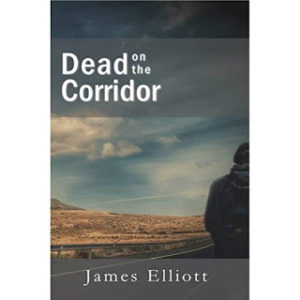 Author: James Elliot
Author: James Elliot
Title: Dead on the Corridor
Anderson Publishing, 2017, 150 pages. Short story collection.
Reviewed by Doug Gibson
In Dead on the Corridor, a collection of short stories from Utah writer James Elliott, a deeply troubled woman, barely alive, enters a welfare office in St. George, Utah. In desperate need of help, she is instead ushered out by a worker whose compassion matches cartoon bureaucrats Selma and Patty Bouvier of The Simpsons.
In blistering heat, the woman returns to a tent outside the city to die. It’s an agonizing, lonely death. But she finds peace in her final moments, clutching a small version of the Christus Consolator statue, a saved, treasured relic from her earlier life as an student in Mormon seminary.
That story, with Elliott’s dispassionate prose, creates passion for the reader. This particular story has stuck with me, and will for a long time. With other stories in the collection, located in the backdrop of the harsh but beautiful of Interstate 15 between Las Vegas and Utah, tales of the least among us, the people who are forced to be survivors, are related.
Besides “The Worth of Souls,” which is the name of the above-mentioned story, other tales involve a young boy, fated to die a painful death accidental death in the desert, reunited with a young, lost murder victim. While his parents live the slow agony of losing a child, the boy makes a friend. Another story, told partially in flashback, recounts an elderly, beloved woman, a sort of “mother” to a ward, relate to her bishop how she killed her fanatical, sadistic husband decades ago.
Another story with a particular punch to this reviewer involves two individuals trying their hardest to survive. One is a former missionary with a big testimony of his faith and severe mental problems. The other is a young woman with a child trying to atone for a past and create a happier life for her small family. Their lives will cross tragically and the survivor will make a hard, callous decision that nevertheless is reasonable given the individual’s circumstances.
Elliott has a lot of talent, and Dead on the Corridor provides a lot for readers to think about as they move through the short stories. Is everyone our brother and sister? Does having a job, financial comforts, control over our mental faculties, and a comfortable place to sleep every night allow us the right to feel superior over those who are struggling to attain those securities?
Dead on the Corridor merits a lot of readers. Elliott, besides the questions his stories offer us, passes the most important test. He spins a good tale. After you read these stories, do the author a favor and leave a review on Amazon.
